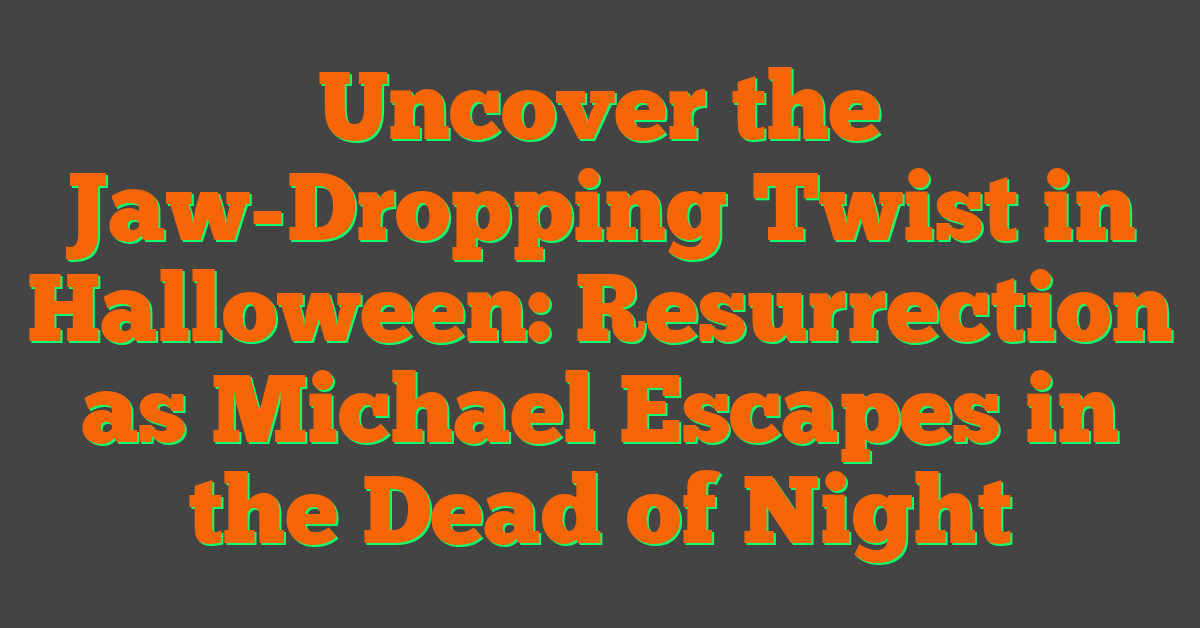Halloween, a holiday celebrated on October 31st, is known for its spooky costumes, carved pumpkins, and trick-or-treating. Despite its popularity and widespread celebration, Halloween is not recognized as a federal holiday in the United States. To understand why this is the case, it is important to examine the criteria that define a federal holiday and the reasons behind Halloween’s exclusion.
A federal holiday is a day recognized by the U.S. government where non-essential federal offices and businesses are closed, and employees are granted a day off with pay. Federal holidays often have historical, cultural, or symbolic significance, and they are typically observed nationwide.
So why isn’t Halloween considered a federal holiday? There are several reasons for this. Halloween has historical origins that differ from typical federal holidays. While federal holidays like Independence Day or Thanksgiving have significant historical events associated with them, Halloween’s roots can be traced back to ancient festivals and traditions.
Another factor that contributes to Halloween’s exclusion as a federal holiday is its religious and cultural significance. Halloween has connections to various religious practices and beliefs, such as Samhain in Celtic culture and the Christian observance of All Saints’ Day. Federal holidays, on the other hand, are intended to be secular and inclusive, avoiding any favoritism towards a specific religion.
There is a lack of consensus among the general population and policymakers regarding Halloween’s status as a federal holiday. Some argue that Halloween should be recognized as a federal holiday due to its popularity and deep-rooted traditions. They believe that it would promote unity and provide a sense of national identity. Others contend that Halloween’s commercialization and focus on entertainment make it an inappropriate candidate for federal holiday status.
Despite arguments for making Halloween a federal holiday, there are challenges and limitations to consider. One major issue is the principle of separation of church and state. Given Halloween’s religious origins and associations, declaring it a federal holiday might raise concerns about favoring certain religious beliefs over others.
The diverse and inclusive nature of American society poses challenges in recognizing a holiday that is primarily rooted in Western cultural traditions. While Halloween is widely celebrated, it may not resonate with everyone, and the inclusion of a holiday should reflect the diverse backgrounds and beliefs of the population.
The logistics and practicality of implementing Halloween as a federal holiday present challenges. This includes determining how it would affect work schedules, public services, and the overall functioning of the country. It would require careful consideration and planning to ensure a smooth transition if Halloween were to be recognized as a federal holiday.
Key takeaway:
- Halloween’s historical origins and cultural significance contribute to it not being a federal holiday.
- The lack of consensus regarding Halloween’s religious significance has also prevented it from becoming a federal holiday.
- Arguments for making Halloween a federal holiday include its popularity, economic impact, and the desire for inclusion and recognition.
What Defines a Federal Holiday?

Photo Credits: Rickyshalloween.Com by Robert Miller
A federal holiday is a day designated by the government to commemorate a significant historical or cultural event. What defines a federal holiday is that it is recognized nationwide and observed by federal employees, and sometimes by state and local governments.
To be a federal holiday, the day must be established by an act of Congress and signed into law by the President. Not all holidays are federal holidays, as they must have broad significance and importance to the nation as a whole.
What defines a federal holiday is that they are non-working days for federal employees, often with paid time off. They typically fall on fixed dates, like July 4th for Independence Day, or on specific days of the week, like the last Monday in May for Memorial Day.
Why Isn’t Halloween a Federal Holiday?
Why isn’t Halloween a federal holiday? Let’s dig into the historical origins, religious and cultural significance, and the lack of consensus surrounding this intriguing topic. Unveiling the reasons behind Halloween’s absence from the list of official federal holidays will shed light on its unique standing in American society. Prepare to delve into the fascinating facts and factors that have influenced Halloween’s classification as something other than a national holiday.
Historical Origins
Halloween has its historical origins in ancient Celtic festivals, particularly the festival of Samhain. The Celts believed that during this time, the boundary between the living and the dead became blurred. To ward off spirits and ghosts, people would light bonfires and wear costumes.
Over time, some aspects of these pagan festivals became incorporated into church traditions as Christianity spread. Pope Gregory IV designated November 1st as All Saints’ Day, or All Hallows’ Day, with the night before, October 31st, becoming known as All Hallows’ Eve, which eventually transformed into Halloween.
In the 19th century, Irish and Scottish immigrants brought Halloween to America, where it gradually evolved into the holiday we celebrate today. It became a secular celebration featuring activities like trick-or-treating, costume parties, and spooky home decorations.
As a fun fact, the first mass-produced Halloween costumes were made in the early 1900s using materials such as crepe paper and fabric.
Exploring the historical origins of Halloween allows us to understand its cultural heritage and the traditions that have been passed down through generations.
Religious and Cultural Significance
Halloween has religious and cultural significance worldwide. It is observed on October 31st and is rooted in ancient Celtic traditions. The holiday marks the end of the harvest season and the beginning of winter, when the barrier between the living and the dead was believed to be thinnest.
Religiously, Halloween is linked to All Hallows’ Eve, which comes before All Saints’ Day and All Souls’ Day. These observances involve remembering and honoring the deceased, offering prayers for their souls, and seeking protection from evil spirits.
Culturally, Halloween has become a time of celebration, costume parties, and trick-or-treating, especially in Western countries. It has gained popularity through movies, books, and media, spreading its cultural significance beyond its religious origins.
While Halloween holds strong religious and cultural significance, its observance and traditions vary among regions and communities. This diversity adds richness to the celebration but makes it challenging to establish a consensus on whether Halloween should be recognized as a federal holiday. The complexity of accommodating different religious and cultural perspectives makes official recognition difficult to achieve.
Lack of Consensus
The lack of consensus is a significant factor in why Halloween has not become a federal holiday. To designate a day as a federal holiday, it is necessary to have widespread agreement and support from the population and government officials. When it comes to Halloween, there is not enough consensus.
The varying opinions and beliefs surrounding Halloween make it challenging to reach a consensus. Some people see Halloween as a fun and harmless holiday, while others have concerns about its origins and religious associations. Cultural differences and diversity also contribute to the lack of consensus.
Because of these differences, there has been no widespread movement or demand to make Halloween a federal holiday. The absence of a unified voice and clear consensus has resulted in Halloween remaining primarily as a holiday celebrated on a smaller scale, within communities and by individuals.
In my neighborhood, there was a discussion among residents about whether Halloween should be a federal holiday. Many parents supported the idea, viewing it as an opportunity for families to come together and create lasting memories. Others expressed concerns about the religious origins of Halloween and whether it was inclusive of all cultures and beliefs. Due to the lack of consensus, the decision was made to keep Halloween as a community celebration instead of making it a federal holiday. This allowed individuals to continue celebrating in their own ways while also acknowledging and respecting the diverse perspectives within the community.
Arguments for Making Halloween a Federal Holiday
Halloween has long captured our imaginations with its spooky charm, but have you ever wondered why it’s not a federal holiday? In this section, we’ll explore the arguments for making Halloween a federal holiday, diving into its popularity and traditions that have withstood the test of time. We’ll also unveil its economic impact and discuss the importance of inclusion and recognition. Get ready to discover the intriguing aspects that make Halloween a contender for official recognition!
Popularity and Tradition
Popularity and Tradition
The popularity and tradition of Halloween can be seen in various aspects of celebration and cultural practices. These include:
– Costume Parties: Halloween is known for its costume parties, where people dress up in creative outfits to celebrate.
– Trick-or-Treating: Children go door-to-door in costumes and receive candy from homeowners.
– Jack-o’-Lanterns: Carving pumpkins into Jack-o’-Lanterns is a classic Halloween activity.
– Haunted Houses: Communities and organizations set up haunted houses for spooky adventures.
– Fall Festivals: These festivals incorporate Halloween-themed activities like pumpkin patches and corn mazes.
To enhance the popularity and tradition of Halloween, consider the following suggestions:
– Community Events: Organize community-wide Halloween events such as parades or outdoor movie screenings.
– Cultural Education: Promote understanding and appreciation of diverse Halloween traditions through educational programs.
– Holiday Decorations: Encourage individuals and businesses to decorate with Halloween-themed displays.
– Participatory Activities: Organize contests that allow people to showcase their creativity in costume designing, pumpkin carving, or house decorations.
Economic Impact
Halloween has an incredible economic impact, generating billions of dollars each year. In 2021, Americans spent approximately $10.14 billion on Halloween-related items, including costumes, decorations, and candy, according to the National Retail Federation. This showcases the immense economic opportunities that Halloween presents to businesses in various sectors like retail, entertainment, and hospitality.
Retailers greatly benefit from the increased demand for Halloween merchandise. Costume shops and party supply stores witness a surge in sales as consumers eagerly dress up and adorn their homes. Moreover, candy manufacturers experience a spike in sales as people stock up on treats for trick-or-treaters. The economic boost from Halloween also extends to the entertainment industry, with amusement parks, haunted houses, and Halloween-themed events attracting large crowds and generating revenue.
In addition to direct consumer spending, Halloween stimulates job creation. Temporary employment opportunities arise in industries such as retail and event management, providing individuals with income during the holiday season. The economic impact of Halloween helps stimulate local economies as businesses flourish, resulting in increased tax revenue for communities.
Pro-tip: Businesses can capitalize on the economic opportunities presented by Halloween by offering special promotions, creating unique Halloween-themed products or experiences, and effectively marketing their offerings to target audiences. By tapping into the widespread enthusiasm for the holiday, businesses can enhance their sales and overall profitability.
Inclusion and Recognition
Incorporating inclusion and recognition is crucial in the discussion of whether Halloween should be recognized as a federal holiday. Recognizing Halloween as a federal holiday not only promotes inclusion, but also acknowledges its significance to numerous individuals and communities. Designating Halloween as a federal holiday affirms the importance of celebrating diverse traditions and cultures, fostering a sense of belonging and unity. It educates individuals about the historical and cultural significance of Halloween.
By making Halloween a federal holiday, everyone can fully participate in the festivities without any conflicts with work or school. This ensures inclusion and a sense of community spirit, as it provides opportunities for activities such as trick-or-treating and attending local events.
Although implementing Halloween as a federal holiday may present challenges, such as logistical considerations and the separation of church and state, the benefits of recognition and inclusivity outweigh these limitations. Inclusion and recognition are essential in nurturing a society that values diversity and promotes a shared sense of belonging. Thus, making Halloween a federal holiday would be a significant step towards achieving these goals.
Challenges and Limitations

Photo Credits: Rickyshalloween.Com by Juan Rivera
Navigating the path towards making Halloween a federal holiday is not without its fair share of challenges and limitations. From addressing the delicate issue of the separation of church and state to ensuring diversity and inclusivity, and tackling the intricate logistics and practicality, there are numerous factors to consider. Join us as we dive into these complexities, shedding light on the obstacles that stand in the way of Halloween becoming an official federal holiday.
Separation of Church and State
The principle of the separation of church and state is the main reason why Halloween is not considered a federal holiday. This important principle ensures that the government remains impartial and independent, without any religious influences. It prohibits the government from endorsing or favoring any specific religious beliefs or practices. Since Halloween has ties to ancient religious festivals such as Samhain, classifying it as a federal holiday would go against the separation of church and state.
The separation of church and state also safeguards religious freedom and protects individuals from being coerced or influenced by the government to participate in religious activities that contradict their own beliefs. Given that Halloween is associated with various religious practices and traditions, making it a federal holiday could potentially infringe upon the rights of individuals who do not observe or agree with those practices.
If Halloween were to be recognized as a federal holiday, it could establish a precedent for other religious holidays to demand the same recognition. This could lead to logistical complications and potentially create divisions among different religious groups, impeding inclusivity.
Diversity and Inclusivity
Diversity and inclusivity are essential when discussing why Halloween is not currently recognized as a federal holiday. Halloween has its roots in Western cultures, particularly in Celtic traditions. The customs and traditions associated with Halloween may not resonate with or represent all cultural or religious groups in the United States.
Declaring Halloween as a federal holiday could potentially exclude or marginalize individuals and communities who do not identify with or participate in Halloween festivities. In order to foster inclusivity, it is vital to acknowledge and respect the diverse beliefs, values, and traditions held by different groups.
Making Halloween a federal holiday may perpetuate the practices of the dominant culture and potentially diminish the significance of other cultural and religious observances that occur around the same time. It is crucial to cultivate an environment that encourages the celebration and understanding of various traditions, rather than favoring one over others.
Taking into account the diversity and inclusivity of the larger population is crucial in determining whether Halloween should become a federal holiday. By celebrating diversity and honoring different beliefs and practices, we can promote a more inclusive and unified society.
Logistics and Practicality
- Security concerns: Incorporating Halloween as a federal holiday would involve evaluating the logistics and practicality of implementing increased security measures for public safety. This could include deploying additional police officers, implementing crowd control strategies, and enhancing emergency response protocols.
- Financial implications: Designating Halloween as a federal holiday would require a thorough examination of the logistical and practical aspects of handling the significant costs involved. This would encompass allocating funds for organizing events, festivals, and other related activities. Businesses and organizations would also need to reassess their financial plans to provide holiday pay and meet the potential surge in demand.
- Scheduling conflicts: The addition of Halloween as a federal holiday would necessitate carefully considering the logistics and practicality of managing potential scheduling conflicts with other existing holidays. This could have implications for work and school schedules, and may pose challenges particularly for industries like healthcare and emergency services.
- Opinions and beliefs: When contemplating a federal holiday status for Halloween, it is imperative to take into account the diverse religious and cultural connotations associated with it. Ensuring inclusivity is a key aspect in assessing the logistics and practicality of such a decision, as it may intersect with the beliefs and practices of certain groups.
- Prioritization of other issues: The government’s responsibility is to effectively allocate resources to address pressing societal issues such as healthcare and education. While acknowledging Halloween’s cultural significance, assessing the logistics and practicality of making it a federal holiday requires considering its relative importance in relation to enhancing the overall well-being and proficiency of the nation.
Frequently Asked Questions
Why is Halloween not a federal holiday?
Halloween is not a federal holiday in the United States because it does not commemorate a date of relevance for American history. Federal holidays in the US are typically reserved for significant events or individuals that have had a major impact on the country. Halloween, although a popular celebration, does not hold this historic significance.
Is Halloween a national holiday in the United States?
No, Halloween is not a national holiday in the United States. It is considered more of a celebration rather than an official holiday. While it is widely celebrated by many Americans, it does not hold the same recognition as other national holidays such as Thanksgiving or Independence Day.
Can Halloween become a national holiday?
For Halloween to become a national holiday in the United States, a proposal would need to be ratified by Congress. Typically, this process would start at the state level with individuals petitioning their local representatives and gathering public support. It is highly unlikely that Halloween will become a national holiday due to its lack of historical or religious connections.
Why don’t people get a day off work on Halloween?
Halloween is not a federally recognized holiday, which is why most people do not get the day off from work. Federal offices like banks and government institutions remain open on Halloween. Halloween parties and celebrations are usually held in the evening, allowing people to participate in the festivities after work.
Do American kids get the day off for Halloween?
No, American kids do not get the day off for Halloween. Since Halloween is not a federal holiday, schools and educational institutions usually remain open on that day. Many schools may organize Halloween-themed activities or parties to celebrate the occasion.
Why is Halloween unlikely to become a federal holiday?
It is highly unlikely that Halloween will become a federal holiday in the United States or elsewhere. Federal holidays in the US typically commemorate dates of relevance for American history, and Halloween does not fit into this category. Halloween is widely celebrated as a cultural observance, rather than having religious or historic significance.







![Harry Potter: 8-Film Collection [4K Ultra HD + Blu-ray]](https://m.media-amazon.com/images/I/91Mn8RRd2tL._SL500_.jpg)






